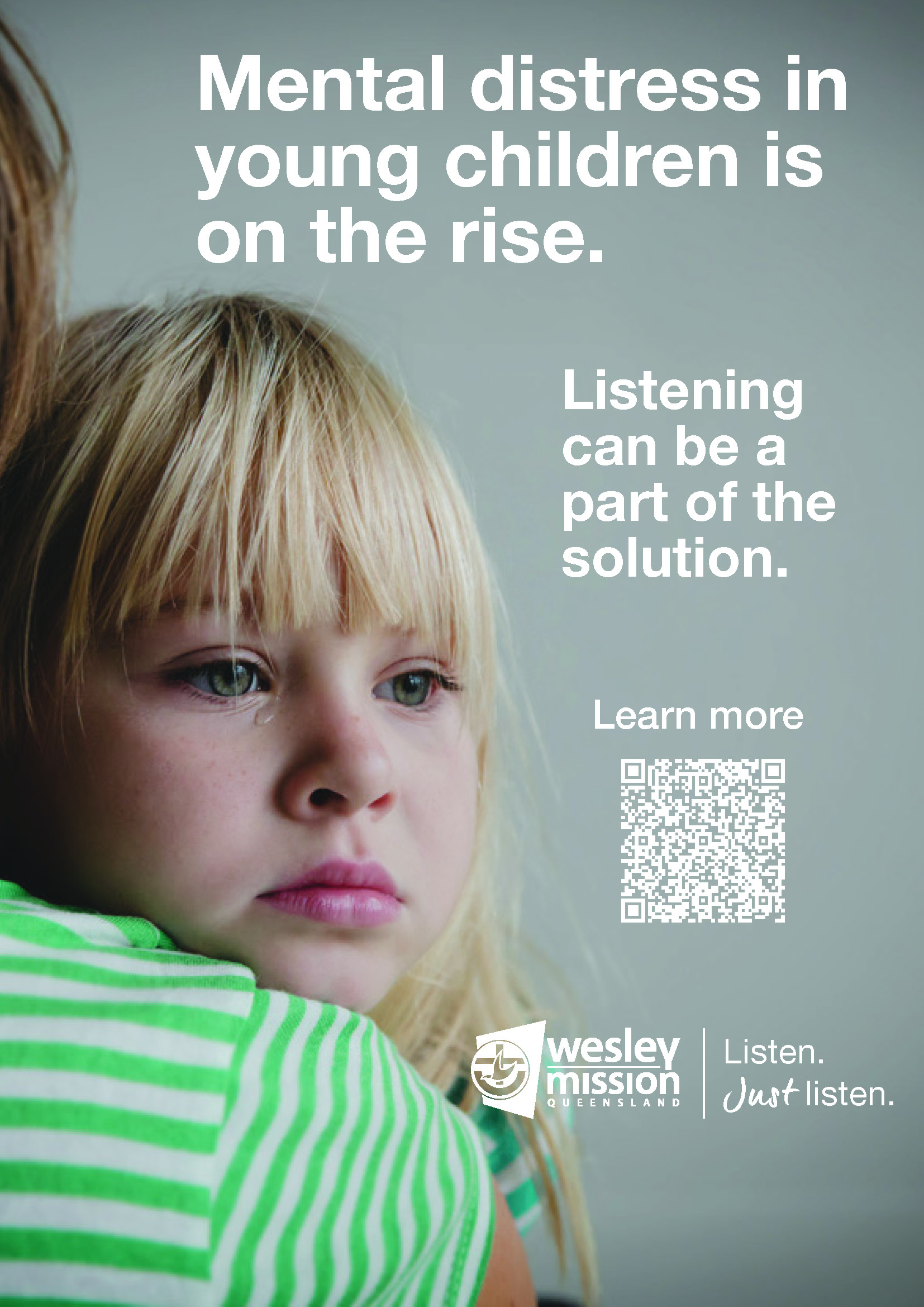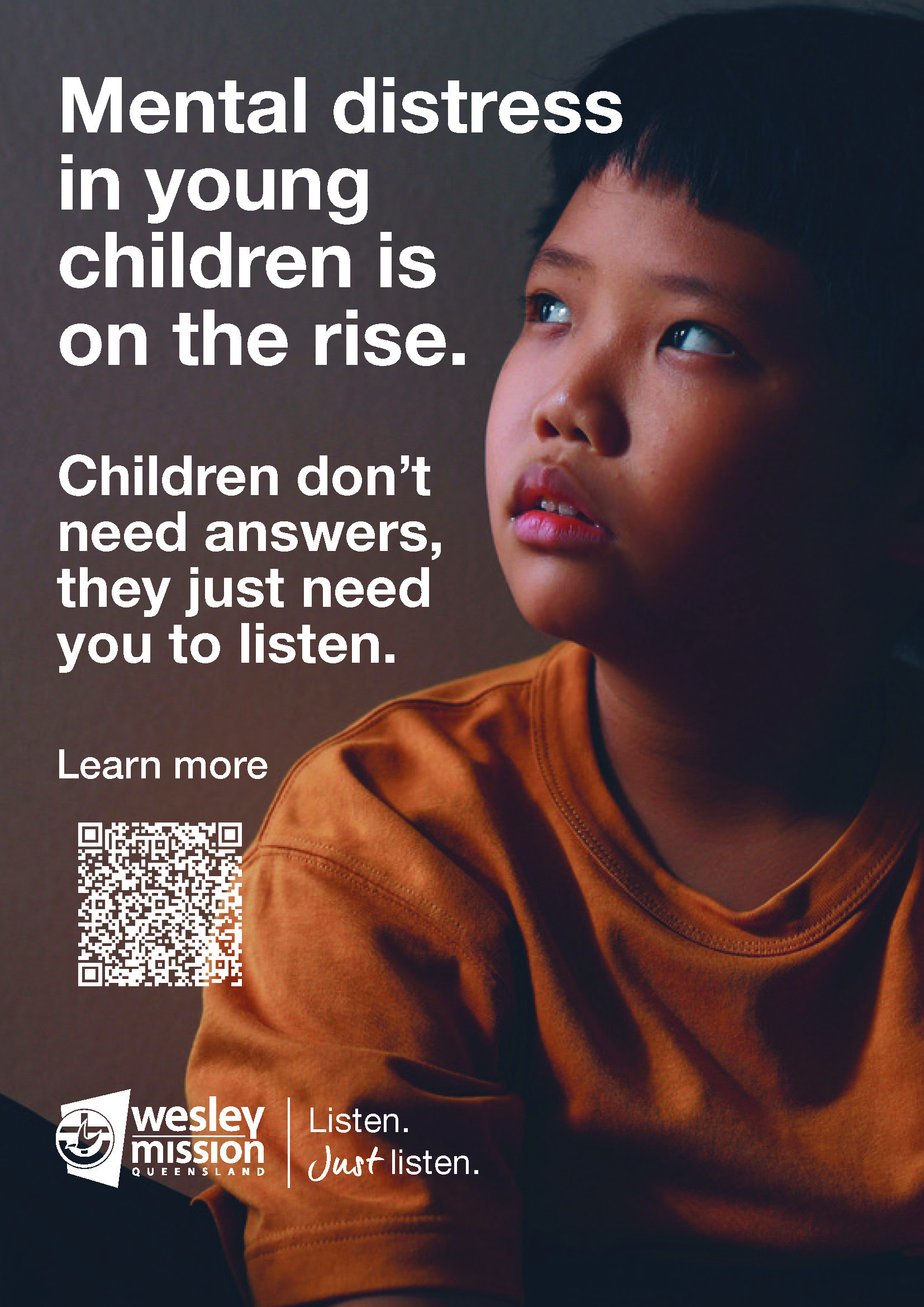
Did you know that 50% of all mental health conditions start before the age of 14?*
And more and more young children are presenting with mental distress that needs support.
Spotting the difference between normal growing struggles and more serious issues in young people can be tough. Learn the signs and listen!
SHARE THIS PAGE
Share on Facebook![]() Share on LinkedIn
Share on LinkedIn![]()
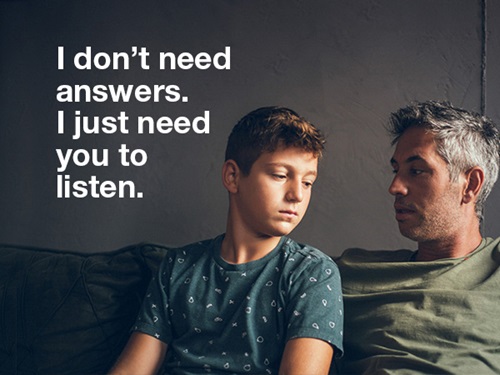

Nobody likes to think about a child in distress, but for many children, these feelings are all too common.
Listen. Just listen. aims to raise awareness of this issue, help reduce the risk of mental health issues later in life, and provide parents and caregivers with simple tools to support children experiencing mental distress.
Why Listen, just listen?
We asked children and young people what advice they would give parents and caregivers facing this issue, and their answers were simple:
- Children don’t expect adults to have all the answers, they just want them to listen.
- There’s no need to problem solve or be an expert, they just need validation and to be heard.
- Listen, just listen is a reminder that creating a safe space for young people to talk and express themselves can help them feel seen, heard and understood - making them better able to cope.
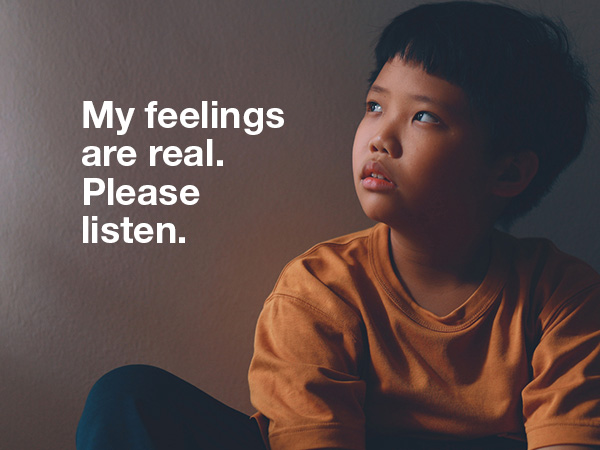
“It’s not enough to just ask the question, you have to show that you really care about the answer.”
Chloe, headspace customer
Signs and tips to listen
While younger children often approach their parents/ caregivers to voice concerns about their emotional wellbeing, parents/caregivers don’t always listen.
The signs listed below may suggest you need to check in with your child and really listen, so that the concerns or emotions they raise are validated.
It’s important to note that these signs on their own may not be cause for concern. If several of these concerns present and persist over time, you may need to seek the advice of a Mental Health Professional. Your GP can support referrals.
- Difficulty concentrating
- Changes in appetite
- Mood swings
- Changes in sleep
- Irritability
- Changes in behaviour
- Seeming unhappy or sad
- Difficulty sleeping
- Getting in fights
- High risk-taking behaviour to self, others and/or property
- Aggressive behaviour
- Avoiding friends and social activities
- Changes at school
- Constant worry or anxiety
- Frequent headaches or stomach aches
- Isolating from family and friends (e.g. spending time in their bedroom and not with their family)
- Sudden reduction in school performance
- Decreased interest in or withdrawal from activities
- Feeling guilty or worthless
- Talking about death
- I’ve noticed_________ (e.g. you have big black bags under your eyes/you seem tired/quiet/you’re not eating much at the moment). Can you tell me what’s up?
- Do you want to talk about what’s going on?
- How can I help with_________?
- Is there anything I can do with_________?
- How can I support you?
- What’s the biggest problem you had today?
Remember to reflect back what you’re observing and ask for your child’s perspective.
Sometimes your child will say they don’t want to talk. That is ok, let them talk when they are ready. You could say ‘let me know when you’re ready and I’ll be here’.
There is decades of evidence that shows that listening is the most helpful first step in supporting a child with intense emotions.
Listening is an important skill for parents/caregivers, but it doesn’t always come easily. Share your feedback in the short form below and gain access to the Quick tips to help you listen fact sheet.
Chloe's story
What I wish my parents knew
Chloe, 21 years old, headspace customer
As a child, my feelings were often dismissed and overlooked. I was told that I had no ‘real’ reason to be distressed, and that I was just being too sensitive. Although it was not my parent’s intention, I learnt that I had to process all of my heavy emotions alone, which left me feeling like I was not important enough to ask for help.
This resulted in an array of emotional wellbeing challenges throughout adolescence, that followed me into adulthood. I am now 21 years old; this is what I wish my parents knew. I know that parents just want to help but I never needed my parents to tell me how to ‘fix it’ or how to feel, when I didn’t feel ok.
Early on, my distress looked like lots of crying and being overwhelmed. Distress can also be internalised and appear in other ways – somatic (physical) symptoms like chronic headaches, fatigue, stomach and muscle pains were very common.
Distress also looked like having high expectations of myself; over-apologising for every mistake and not thinking that anything I did was good enough. I wish someone was able to give me space to talk about my feelings, to feel supported after a bad day, or even just to tell me that my feelings mattered.
Having someone listen, just listen, would have given me the space to process my feelings and to feel heard. It also would have allowed me to practice sitting with, and working through, troubling emotions, rather than just hold them all in.
This is important as it allows us to learn how to effectively regulate emotions and develop crucial interpersonal communication skills. Genetically, I was predisposed to need support in managing my emotions and cognitions, but I believe that although I was always going to have struggles, if I had felt more heard I wouldn’t have had to struggle as much as I did.
My parents often used to ask what I wanted them to do to ‘fix things’; now as an adult I can finally offer some suggestions:
- Just listen; you don’t need to fix it. It is ok not to have all the answers! Sitting with children in distress and together tolerating the discomfort of not knowing what to do, can reassure them that they are safe and able to make it through the distress.
- Ask questions unconditionally. Stop, listen and focus on how your child responds. Even if it takes more attention or time than you anticipated, it’s so important to make sure your child’s response feels heard. Even a small question like How was your day or how are you feeling, can open up a conversation. It’s not enough to just ask the question, you have to show that you really care about the answer.
- Don’t stop trying. It can be so hard for parents to see their child in distress but by just being there for them you really are making a difference.
Spread the word
Support Listen. Just listen. by sharing the A4 posters with:
- Schools
- Community and medical centres
- Cafes
- Other local businesses
“If I had felt more heard I wouldn’t have had to struggle as much as I did. Even a small question like 'How was your day' or 'how are you feeling', can open up a conversation.”
Chloe, headspace customer
Remember, you're not alone
Talking to healthcare professionals can bring the support and reassurance you need.
Immediate help
If you or a loved one needs immediate help please contact one of the support networks below.
Kids Helpline
24/7 service for kids and teens
Kids Helpline is a free and confidential 24/7 online and phone counselling service for kids, teens, and young people who want to talk about anything, at any time.
Lifeline
24/7 service
Free, confidential, one-to-one support for people who are feeling overwhelmed or having difficulty coping or staying safe, via online chat, phone or text messages (0477 13 11 14).
WebChat 24/7
Visit their website
Text messages (SMS): 0477 13 11 14.
Contact the mental health team
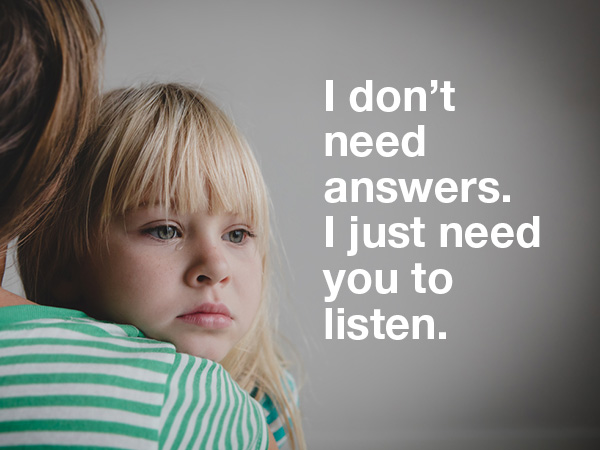
In collaboration with

*Data collected from Wesley Mission Queensland’s various mental health services and from 'Kessler, R.C., et al., Lifetime prevalence and age-ofonset distributions of DSM-IV disorders in the National Comorbidity Survey Replication. Archives of General Psychiatry, 2005. 62(6): p. 593-602. DOI: doi: https://doi.org/10.1001/archpsyc.62.6.593'
